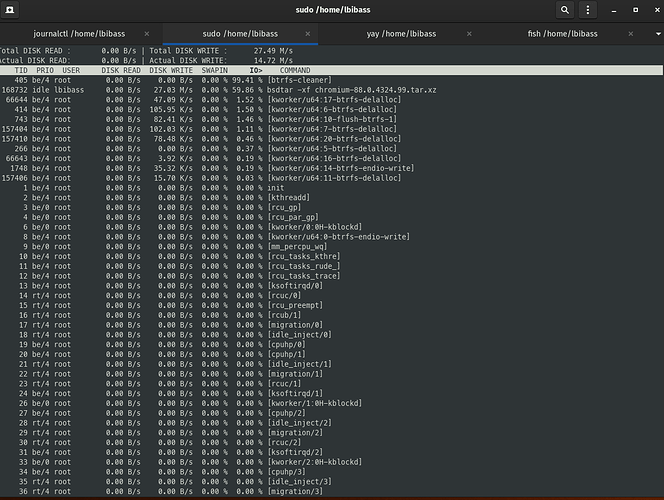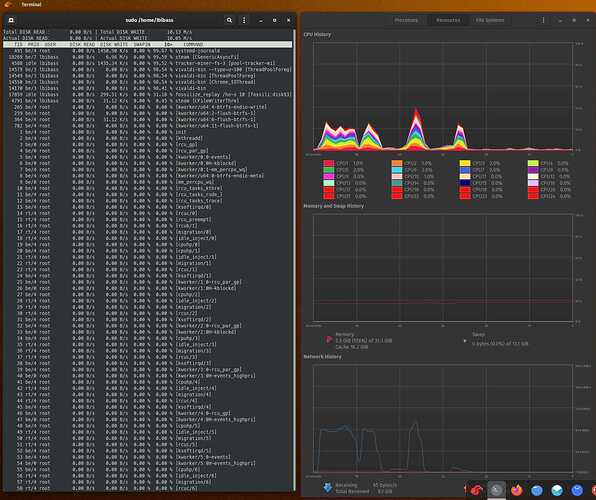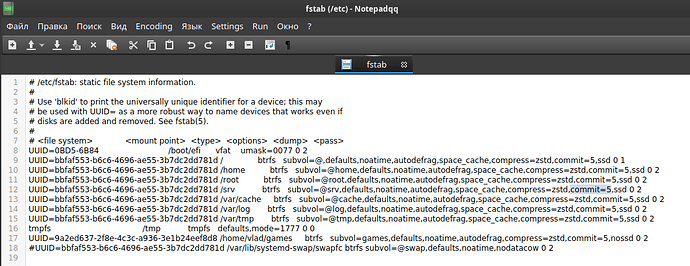# SATA Active Link Power Management
ACTION=="add", SUBSYSTEM=="scsi_host", KERNEL=="host*", ATTR{link_power_management_policy}="max_performance"Instead of chasing a wild goose, I would try reinstalling again to see if that fixes the problem.
No, I have not mounted any network shares.
You realize this would now be the 6th time I have reinstalled Garuda in the last 2 days?
Reinstalling has fixed nothing. I mentioned this in my original post.
You updated your bios a few days back. Perhaps the bios update is flawed.
Sorry but nowhere in your OP do you mention installing 6 times, only that you reinstalled once and that is when the problems started. And tried reinstalling maybe once more?
I updated my bios in an attempt to fix whatever issues I had been having. They started before the bios update.
Did you completely wipe the drive and partition and did the problem exist right after installation? Or did it show up after you installed a bunch of stuff?
As I see you have AMD cpu why dont you just switch one of zen-kernels?
There are missing parts of your inxi. CPU RAM …
parameters: intel_pstate=passive BOOT_IMAGE=/@/boot/vmlinuz-linux-tkg-bmq
root=UUID=474db5d5-5d93-4f07-a3aa-77d5c9a52327 rw rootflags=subvol=@ rd.udev.log_priority=3
vt.global_cursor_default=0 systemd.unified_cgroup_hierarchy=1 loglevel=3 mitigations=off sysrq_always_enabled=1
Desktop: GNOME 3.38.3 tk: GTK 3.24.24 wm: gnome-shell dm: GDM 3.38.2.1 Distro: Garuda Linux
Machine: Type: Desktop Mobo: ASUSTeK model: ROG STRIX X570-I GAMING v: Rev X.0x serial: <filter> UEFI: American Megatrends
v: 3406 date: 02/04/2021
Battery: ID-1: hidpp_battery_0 charge: N/A condition: N/A volts: 4.2/N/A model: Logitech G903 Wired/Wireless Gaming Mouse
type: N/A serial: <filter> status: Full
Device-1: apple_mfi_fastcharge model: N/A serial: N/A charge: N/A status: N/A
CPU: Info: 12-Core model: AMD Ryzen 9 3900X socket: AM4 bits: 64 type: MT MCP arch: Zen 2 family: 17 (23)
model-id: 71 (113) stepping: N/A microcode: 8701021 L1 cache: 768 KiB L2 cache: 6 MiB L3 cache: 62.5 MiB
flags: avx avx2 lm nx pae sse sse2 sse3 sse4_1 sse4_2 sse4a ssse3 svm bogomips: 182579
Speed: 3670 MHz min/max: 2200/3800 MHz base/boost: 3800/4650 boost: enabled volts: 1.1 V ext-clock: 100 MHz
Core speeds (MHz): 1: 3670 2: 4048 3: 3599 4: 3600 5: 3458 6: 3595 7: 3591 8: 3586 9: 3586 10: 3578 11: 3600
12: 3599 13: 3716 14: 3591 15: 3598 16: 3592 17: 3600 18: 3618 19: 3600 20: 3807 21: 3600 22: 3600 23: 4238
24: 3599
Vulnerabilities: Type: itlb_multihit status: Not affected
Type: l1tf status: Not affected
Type: mds status: Not affected
Type: meltdown status: Not affected
Type: spec_store_bypass status: Vulnerable
Type: spectre_v1 status: Vulnerable: __user pointer sanitization and usercopy barriers only; no swapgs barriers
Type: spectre_v2 status: Vulnerable, IBPB: disabled, STIBP: disabled
Type: srbds status: Not affected
Type: tsx_async_abort status: Not affected
Graphics: Device-1: Advanced Micro Devices [AMD/ATI] Navi 10 [Radeon RX 5600 OEM/5600 XT / 5700/5700 XT]
vendor: Sapphire Limited driver: amdgpu v: kernel bus ID: 0b:00.0 chip ID: 1002:731f class ID: 0300
Display: server: X.Org 1.20.10 compositor: gnome-shell driver: loaded: amdgpu,ati unloaded: modesetting,radeon
alternate: fbdev,vesa display ID: :1 screens: 1
Screen-1: 0 s-res: 3440x1440 s-dpi: 96 s-size: 910x381mm (35.8x15.0") s-diag: 987mm (38.8")
Monitor-1: DisplayPort-1 res: 3440x1440 hz: 144 dpi: 109 size: 800x335mm (31.5x13.2") diag: 867mm (34.1")
OpenGL: renderer: AMD Radeon RX 5700 XT (NAVI10 DRM 3.40.0 5.10.14-119-tkg-bmq LLVM 11.0.1) v: 4.6 Mesa 20.3.4
direct render: Yes
Audio: Device-1: Advanced Micro Devices [AMD/ATI] Navi 10 HDMI Audio driver: snd_hda_intel v: kernel bus ID: 0b:00.1
chip ID: 1002:ab38 class ID: 0403
Device-2: Advanced Micro Devices [AMD] Starship/Matisse HD Audio vendor: ASUSTeK driver: snd_hda_intel v: kernel
bus ID: 0d:00.4 chip ID: 1022:1487 class ID: 0403
Device-3: Logitech Logitech BRIO type: USB driver: hid-generic,snd-usb-audio,usbhid,uvcvideo bus ID: 6-1.3:4
chip ID: 046d:085e class ID: 0300 serial: <filter>
Device-4: Blue Microphones Yeti Stereo Microphone type: USB driver: hid-generic,snd-usb-audio,usbhid
bus ID: 5-1.2.3:9 chip ID: b58e:9e84 class ID: 0300 serial: <filter>
Sound Server: ALSA v: k5.10.14-119-tkg-bmq
Network: Device-1: Intel Wi-Fi 6 AX200 driver: iwlwifi v: kernel bus ID: 04:00.0 chip ID: 8086:2723 class ID: 0280
IF: wlp4s0 state: down mac: <filter>
Device-2: Intel I211 Gigabit Network vendor: ASUSTeK driver: igb v: kernel port: f000 bus ID: 05:00.0
chip ID: 8086:1539 class ID: 0200
IF: enp5s0 state: up speed: 1000 Mbps duplex: full mac: <filter>
IF-ID-1: enp13s0f3u2c4i2 state: down mac: <filter>
Bluetooth: Device-1: Intel AX200 Bluetooth type: USB driver: btusb v: 0.8 bus ID: 3-6:3 chip ID: 8087:0029 class ID: e001
Message: Required tool hciconfig not installed. Check --recommends
Drives: Local Storage: total: 2.29 TiB used: 207.53 GiB (8.9%)
SMART Message: Required tool smartctl not installed. Check --recommends
ID-1: /dev/nvme0n1 maj-min: 259:0 vendor: Sabrent model: Rocket 4.0 2TB size: 1.82 TiB block size: physical: 512 B
logical: 512 B speed: 63.2 Gb/s lanes: 4 rotation: SSD serial: <filter> rev: RKT401.2 temp: 43.9 C scheme: GPT
ID-2: /dev/sda maj-min: 8:0 type: USB model: ROG ESD-S1C size: 476.94 GiB block size: physical: 512 B
logical: 512 B serial: <filter> scheme: GPT
Partition: ID-1: / raw size: 476.64 GiB size: 476.64 GiB (100.00%) used: 207.53 GiB (43.5%) fs: btrfs block size: 4096 B
dev: /dev/sda2 maj-min: 8:2
ID-2: /boot/efi raw size: 300 MiB size: 299.4 MiB (99.80%) used: 560 KiB (0.2%) fs: vfat block size: 512 B
dev: /dev/sda1 maj-min: 8:1
ID-3: /home raw size: 476.64 GiB size: 476.64 GiB (100.00%) used: 207.53 GiB (43.5%) fs: btrfs block size: 4096 B
dev: /dev/sda2 maj-min: 8:2
ID-4: /var/log raw size: 476.64 GiB size: 476.64 GiB (100.00%) used: 207.53 GiB (43.5%) fs: btrfs
block size: 4096 B dev: /dev/sda2 maj-min: 8:2
ID-5: /var/tmp raw size: 476.64 GiB size: 476.64 GiB (100.00%) used: 207.53 GiB (43.5%) fs: btrfs
block size: 4096 B dev: /dev/sda2 maj-min: 8:2
Swap: Kernel: swappiness: 10 (default 60) cache pressure: 75 (default 100)
ID-1: swap-1 type: zram size: 1.31 GiB used: 0 KiB (0.0%) priority: 32767 dev: /dev/zram0
ID-2: swap-2 type: zram size: 1.31 GiB used: 0 KiB (0.0%) priority: 32767 dev: /dev/zram1
ID-3: swap-3 type: zram size: 1.31 GiB used: 0 KiB (0.0%) priority: 32767 dev: /dev/zram2
ID-4: swap-4 type: zram size: 1.31 GiB used: 0 KiB (0.0%) priority: 32767 dev: /dev/zram3
ID-5: swap-5 type: zram size: 1.31 GiB used: 0 KiB (0.0%) priority: 32767 dev: /dev/zram4
ID-6: swap-6 type: zram size: 1.31 GiB used: 0 KiB (0.0%) priority: 32767 dev: /dev/zram5
ID-7: swap-7 type: zram size: 1.31 GiB used: 0 KiB (0.0%) priority: 32767 dev: /dev/zram6
ID-8: swap-8 type: zram size: 1.31 GiB used: 0 KiB (0.0%) priority: 32767 dev: /dev/zram7
ID-9: swap-9 type: zram size: 1.31 GiB used: 0 KiB (0.0%) priority: 32767 dev: /dev/zram8
ID-10: swap-10 type: zram size: 1.31 GiB used: 0 KiB (0.0%) priority: 32767 dev: /dev/zram9
ID-11: swap-11 type: zram size: 1.31 GiB used: 0 KiB (0.0%) priority: 32767 dev: /dev/zram10
ID-12: swap-12 type: zram size: 1.31 GiB used: 0 KiB (0.0%) priority: 32767 dev: /dev/zram11
ID-13: swap-13 type: zram size: 1.31 GiB used: 0 KiB (0.0%) priority: 32767 dev: /dev/zram12
ID-14: swap-14 type: zram size: 1.31 GiB used: 0 KiB (0.0%) priority: 32767 dev: /dev/zram13
ID-15: swap-15 type: zram size: 1.31 GiB used: 0 KiB (0.0%) priority: 32767 dev: /dev/zram14
ID-16: swap-16 type: zram size: 1.31 GiB used: 0 KiB (0.0%) priority: 32767 dev: /dev/zram15
ID-17: swap-17 type: zram size: 1.31 GiB used: 0 KiB (0.0%) priority: 32767 dev: /dev/zram16
ID-18: swap-18 type: zram size: 1.31 GiB used: 0 KiB (0.0%) priority: 32767 dev: /dev/zram17
ID-19: swap-19 type: zram size: 1.31 GiB used: 0 KiB (0.0%) priority: 32767 dev: /dev/zram18
ID-20: swap-20 type: zram size: 1.31 GiB used: 0 KiB (0.0%) priority: 32767 dev: /dev/zram19
ID-21: swap-21 type: zram size: 1.31 GiB used: 0 KiB (0.0%) priority: 32767 dev: /dev/zram20
ID-22: swap-22 type: zram size: 1.31 GiB used: 0 KiB (0.0%) priority: 32767 dev: /dev/zram21
ID-23: swap-23 type: zram size: 1.31 GiB used: 0 KiB (0.0%) priority: 32767 dev: /dev/zram22
ID-24: swap-24 type: zram size: 1.31 GiB used: 0 KiB (0.0%) priority: 32767 dev: /dev/zram23
Sensors: System Temperatures: cpu: 52.8 C mobo: N/A gpu: amdgpu temp: 57.0 C mem: 70.0 C
Fan Speeds (RPM): N/A gpu: amdgpu fan: 0
Info: Processes: 526 Uptime: 17m wakeups: 3 Memory: 31.33 GiB used: 5.81 GiB (18.6%) Init: systemd v: 247 Compilers:
gcc: 10.2.0 clang: 11.0.1 Packages: pacman: 1261 lib: 388 Shell: fish (sudo) v: 3.1.2 default: Bash v: 5.1.4
running in: gnome-terminal inxi: 3.3.01
There’s the full inxi.
I have tried that, it changed nothing.
the problem showed up after I installed steam and my web browser. That’s it.
Trying to install a different web browser causes my system to grind to a halt again, trying to unzip a file.
Seems like a filesystem issue. Try checking SMART.
Problem in default garuda's btrfs tweak.
I found solution for me, maybe it can help you.
Try this :
Edit /etc/fstab and edit every "commit=120" to "commit=30" - save and reboot. If lags don't go out try "commit=15 or 5".
SMART reports OK.
There’s no “commit=120” in that file. Where should I insert that change?
edit: figured it out.
Still no difference.
I think you should check if the drive has many improperly formed file names that do not comply with unix file naming standards.
I have experienced issues in the past where the drive passed all smartmon tests, yet it was that one specific drive that caused I/O problems. The only cure in that case was to use an old kernel and change to one of the old schedulers to avoid issues. This drive caused system hangs unless I used a specific kernel and scheduler combination.
Eventually I clued in that even though the drive tested fine, it was responsible for the problems. It was an old drive, and I simply retired it. When I checked, it had many malformed Unix file names that may have contributed to the issue (or it may have simply been close to failure).
Perhaps you should also check to see if their is a firmware update for your SSD/NVMe drives (if you haven't done so already).
Please, do not post pictures from text files.
I would also test a Real Time (RT) kernel as I sometimes found them useful in these types of situations.
Here are some links you might want to read read:
When I plugged my drive into my motherboard, there was no firmware update.
The file naming issue seems like a weird one. Not sure what would cause this sudden change… but I don’t know.
Running out of suggestions.
Many reports of freezing with btrfs quota enabled.
https://forums.linuxmint.com/viewtopic.php?t=337637
Read link completely first (then decide if you want to disable):
sudo btrfs quota disable /
This will impact timeshift, but possibly might help with your issue.
Btrfs documentation regarding adding quota support in BTRFS:
https://btrfs.wiki.kernel.org/index.php/Quota_support
I believe this is enabled by default on most Garuda editions (definitely with KDE).


